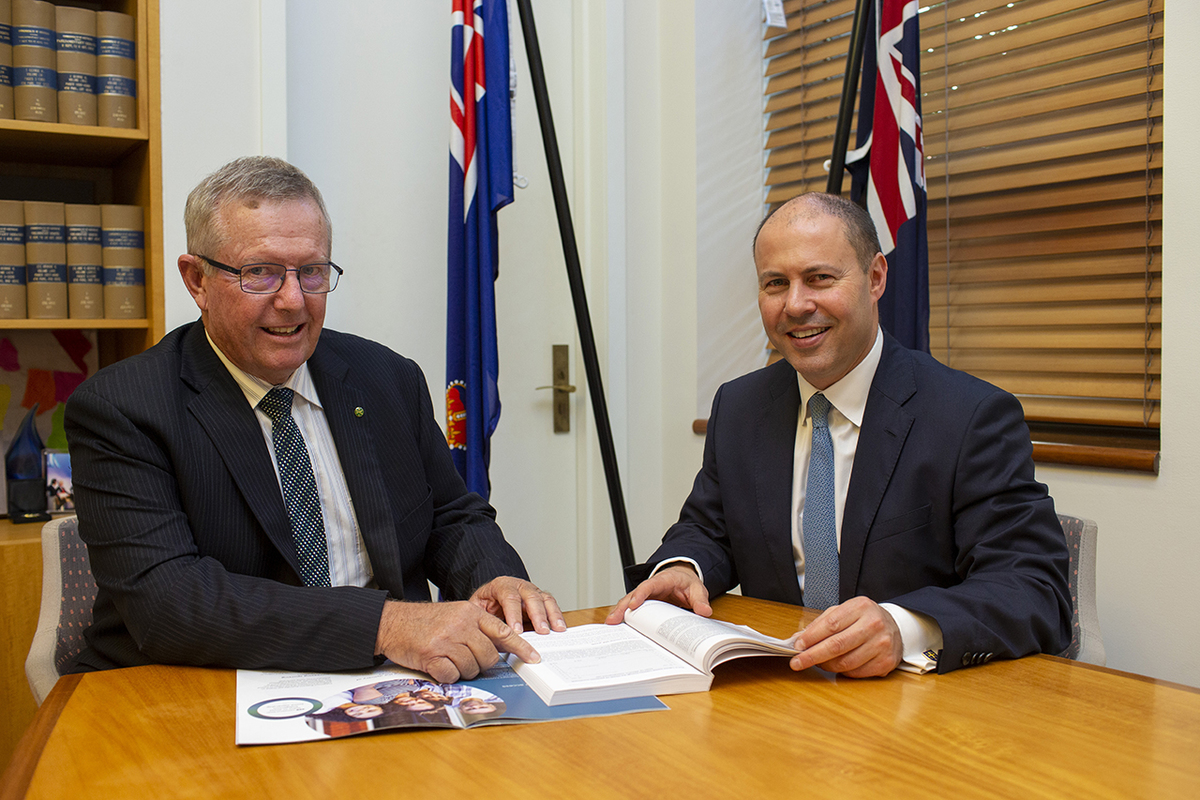Budget boost to Rural Bulk Billing a health 'game changer'
Lee O'Connor
11 May 2021, 12:16 AM
 Federal Regional Health Minister Mark Coulton and Treasurer Josh Frydenberg say the 2021 Federal Budget will provide a boost to rural bulk billing
Federal Regional Health Minister Mark Coulton and Treasurer Josh Frydenberg say the 2021 Federal Budget will provide a boost to rural bulk billingTONIGHT’S federal budget will include an allocation of $65.8 million to boost bulk billing rebates and provide more affordable healthcare for patients in regional, rural and remote areas from 1 January 2022.
A new, progressive incentive schedule will be applied, that increases the value of the Rural Bulk Billing Incentive (RBBI) based on remoteness. It is expected to enhance the financial viability of practices in rural and remote areas as well as reducing the gap paid by patients.
The more remote the area based on the Modified Monash model (MM), the greater the incentive payment they will receive per eligible consultation to recognise the greater challenges and cost pressures.
The new initiative has been strongly welcomed by the Rural Doctors Association of Australia (RDAA).
RDAA President, Dr John Hall, said this was a very important shift in Government policy that RDAA hopes to see reflected in all new and reviewed Government programs.
“This investment will be a game changer for rural and remote primary care,” Dr Hall said.
“For the first time in Medicare we are seeing Government recognise that there are on-the-ground differences between delivering General Practice care in regional; rural; and remote areas, compared to larger regional and metropolitan cities.”
Federal Regional Health Minister, Mark Coulton said the Coalition Government is delivering the rural bulk billing incentives in recognition of the ongoing need to provide the right incentives for the heath workforce in rural, regional and remote areas.
“Australians in rural and remote areas have poorer access to and use of health services, compared to people living in metropolitan areas,” Minister Coulton said.
“The new Rural Bulk Billing Incentive will support those GPs providing services to people in greatest need and who have the lowest propensity to pay for healthcare; our government understands GPs outside of our metropolitan areas face greater cost and workforce pressures.”
Minister Coulton said more than 12,000 rural and remote GPs will be eligible for the higher bulk billing incentive.
“Doctors in the bush face a greater burden of responsibility, more complex care situations, and high rates of chronic disease compared with doctors in the cities, who can rely on support from other medical services and facilities,” he said.
The higher incentives for rural and remote medical practices should also reduce out of pocket costs to patients and encourage more GPs to bulk bill.
The Modified Monash Model (MMM) categorises all Australian locations as urban, regional, or remote. It gives places a category from MM 1 (city) to MM 7 (very remote) based on their population size and remoteness from capital cities.
It was developed to better target health workforce programs to attract health professionals to more remote and smaller communities and health programs moved to the new MMM, which is based on the 2016 Census, in 1 January 2020.
Gulargambone is included in the MM5 category (Small rural towns) while Coonamble, Baradine, Carinda and Quambone are listed as MM6 (Remote communities).
The RBBI encourages doctors to offer medical services without out of pocket costs to vulnerable populations, including children under 16, senior Australians and concession cardholders.
Bulk-billing doctors outside metropolitan areas currently receive 150 per cent of the base BBI across the board (MM2-7). The new payment rates, based on the base BBI for metropolitan areas, will see large and medium rural locations (MM 3-4) at 160 per cent of the base rate; small rural locations (MM 5) at 170 per cent of the base rate; rural locations (MM 6) at 180 per cent of the base rate, and very remote locations (MM 7) at 190 per cent of the base rate.
This means, from 1 January 2022, doctors practicing in rural and remote areas will be able to receive an incentive payment of up to $12.35 per consultation.
There is no change to the RBBI rate for doctors in MM 2 locations (150 per cent).
“We feel the scaling of this bulk billing initiative is well-considered, with large regional centres continuing to receive an additional payment over metropolitan practices, but the new, scaled payment arrangements recognising the additional complexity and costs in delivering General Practice care into increasingly remote areas,” Dr Hall said.
“RDAA would like to acknowledge Minister for Regional Health Mark Coulton, for his support and recognition of this position in our discussions and look forward to continuing to work with him on further policy development to ensure new or reviewed programs are put to the ‘real rural’ test.”